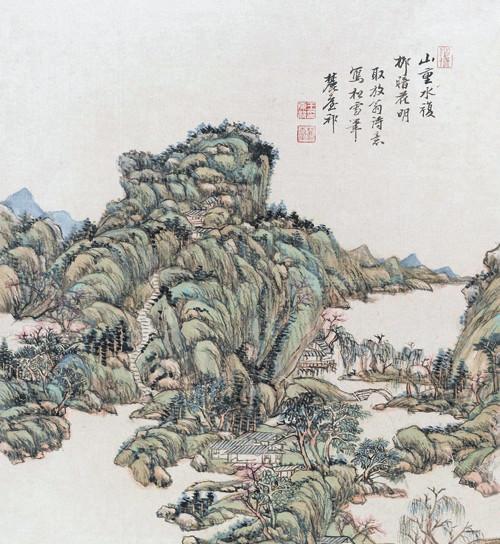Wang Yuanqi was a famous painter of the Qing Dynasty, born in Shuxiangmendi. His grandfather and uncle were both masters of the art world, and in his generation, he inherited the family inheritance. Wang Yuanqi was very proud in the official field and the painting world, and as a favorite of the Kangxi Emperor, he led the compilation of the Peiwenzhai Calligraphy and Painting Notation. For an official painter, this is a great grace. Because the Kangxi Emperor's study was called "Pei Wen Zhai", the emperor took him as an internal servant, and he directly served the emperor.
Wang Yuanqi's fame and achievements are high, but his evaluation of him is polarized. People who like him praise his works for their "infatuation" and pay attention to pen and ink techniques. People who hate him feel that his works are the same, that they are stylized everywhere, and that every stroke can see the calendar, but there is no Wang Yuanqi's own characteristics. In the end, how to evaluate Wang Yuanqi is not something that can be clearly explained in a few words. It is advisable to start with this "Small Scene of a Mountain Village" to see his advantages and disadvantages in creation.

Wang Yuanqi Small scenery of mountain village
The theme of this "Small Scene in a Mountain Village" comes from Lu You's poem, "The mountains and rivers are doubtful and there is no way, and the willows are dark and the flowers are bright and another village". In terms of technique, he learned Zhao Songxue's green technique. The poetry of the Song people and the brush meaning of the Yuan people are in line with the aesthetic taste of the painters of the early Qing Dynasty from the conception. The painters of the early Qing Dynasty were influenced by Dong Qichang at the end of the Ming Dynasty and liked to express the feelings of the literati. Therefore, he often used the painting techniques of the Yuan Dynasty to create poetic intentions, thereby enhancing the artistic conception of his works.
Unfortunately, Wang Yuanqi's expression method is too conservative, and the composition does not reflect the beauty of "mountains and rivers", but makes people feel that the scenery in the painting is artificially stacked "bonsai". The idea is good, but the ability is not enough. Would it be too much to talk about Wang Yuanqi in this way?
Wang Yuanqi Mountain Village Small View Partial
Wang Yuanqi likes to engage in formalism in composition, and he even integrates the theory of feng shui into the composition of landscape painting. For example, he likes to paint the undulating mountain terrain of opening and closing, and feels that he is expressing the "dragon vein". As everyone knows, it makes people feel that the picture is full and depressing.
It's like Wang Yuanqi always shows the best things, everywhere is good, but it's not good to get together. There is focus everywhere, and after becoming a whole, there is no focus. In addition, he uses green techniques to emphasize the decorative beauty of the picture, which is purely a snake painting. In terms of traditional techniques, he is very capable and artistically highly accomplished. But his thinking is too rigid, he doesn't know how to be flexible, or he doesn't want to be flexible. Every stroke has a history, and every stroke does not belong to his feelings.
For a painter like Wang Yuanqi, whose strengths and weaknesses are particularly in conflict, when he paints such a fresh and simple and complex composition as "Small Scenes in Mountain Villages", all that is revealed is the shortcomings. He is suitable for painting works such as "Tianbao Jiuru" and "Great Achievements", and is not suitable for painting works that are quiet and beautiful and full of life interest.
As an official for a long time, he lacked attention to the lives of the people, and even less opportunities to enjoy the wild fun of the mountains and forests. He thought that with his skills, he could successfully complete the work, and the result became incomparable.
"Small Scenery of Mountain Villages" is suitable for decomposition into several parts of appreciation, and there are advantages worth learning in each detail. Only he could not learn from Wang Yuanqi's formalism in creation, nor could he learn the sense of piling that he liked.